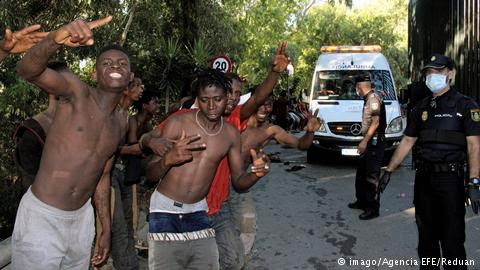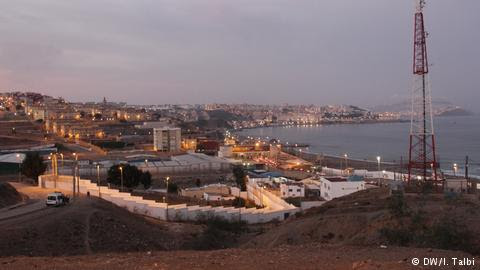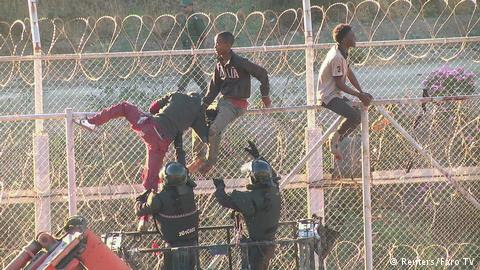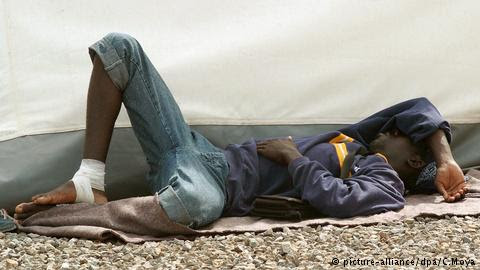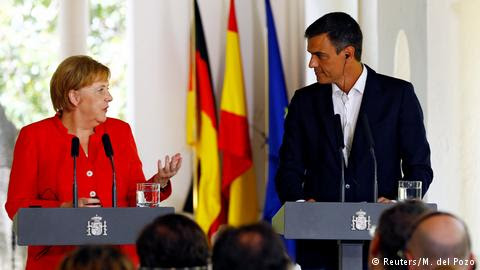Deutche welle
Oliver Sallet (Ceuta)
In the Morocco mountains, thousands of African refugees lie in wait for their chance to cross the border fence into Ceuta. The Spanish enclave has become an increasingly popular destination for migrants headed to Europe.
Slowly, Moussa walks back to his hideout in the Moroccan mountains, his head lowered so as not stick out of the bushes. He doesn’t want to be seen by the Moroccan police; they have been mercilessly hunting down him and his friends. Thanks to his camouflage army jacket, he is barely visible among the shrubs.
Human Rights | 26.07.2018
Over 600 migrants force entry into Spain’s African exclave
Even so, the police are able to keep finding his hideout, no matter how well he disguises it. This particular morning, the police have come back to the valley where Moussa, who hails from Guinea, and his friends have been living for half a year. Again, the officers have destroyed everything they could find. The cardboard boxes the young men have been using as bedding have been torn to pieces, as well as what little food they found in a nearby dumpster: torn packs of noodles, a few moldy potatoes.
Read more: Is Spain facing a new wave of xenophobia over migrants?
“Look here,” calls Moussa, pointing to the remains of a straw-filled cloth sack — it used to be his mattress, but is now sliced and emptied in the bushes nearby.
Society | 13.08.2018
Morocco removing migrants from coast: report
Many refugees in Africa dream of reaching Europe, but the journey there can be long and dangerous
Give up? Never
Life here is hell, they say, but giving up is out of the question. Either they find a way over the Ceuta fence, explained Moussa, or they will stay here — inshallah, if it is God’s will. All of them have experienced horrors on their journeys through the Sahara. They would never give up just because of six meters of barbed wire, no matter what the Moroccan police do to them, no matter how bad the wounds they have received attempting to breach the fence. Moussa’s ankles reveal how many times he has tried. Every attempt leaves its scars, and his legs are full of them.
Read more: Morocco: A risky migration partner for the EU
The Ceuta fence is 8 kilometers (5 miles) long and 6 meters (20 feet) tall. Shreds of clothing lost during previous attempts to climb it hang from the razor-sharp barbed wire, like a warning for others. But the lure of Europe, so close, is far too great. Along with the second Spanish enclave, Melilla, the Ceuta fence marks the only European Union border on the African continent. Nowhere else can refugees in Africa get closer to EU territory without risking their lives in the Mediterranean Sea.
On the Spanish side of the fence, Alfonso Cruzado and his 600 colleagues from the Guardia Civil are tasked with securing the border — but as of late, they have not always found success. Since the new government in Italy sealed off its borders and harbors, the western Mediterranean route, as it has come to be called, has become the most important path to Europe. According to the International Organization for Migration (IOM), 18,000 people came to Europe via Spain between January and mid-July of 2018. Another 3,000 have tried to enter the EU via the Spanish enclaves of Ceuta and Melilla. The number of refugees on the western Mediterranean route has tripled since 2017, notes the IOM.
In July, more than 600 migrants were able to cross the border fence into Ceuta
Crossing by any means necessary
And the Spanish border guards are feeling it. At the end of July, more than 600 migrants were able to cross the fence. This has happened before, but this time the migrants were “more brutal than ever,” said Cruzado. After scaling the fence with grappling hooks, they sprayed the officers with caustic lime, acid and homemade flamethrowers, forcing the police to remain a safe distance away.
Read more: What you need to know: The German-Spanish migrant deal
“Bossa, Bossa,” they called back when they were taken to the CETI refugee reception center.
“Victory” over the fence. Pictures of the hundreds of celebrating refugees from sub-Saharan Africa spread around the globe. For the men, who are typically under 20 years old, a several-year-long ordeal ends; many of them barely escaped slavery on their trek through the Sahara. After years of flight, they now believe they have reached their destination. But what comes next is completely uncertain. The reception camp is bursting at the seams. The refugees have to stay here for one year before they can continue on to the Spanish mainland. Very few people even apply for asylum here — hardly any of them can count on a favorable decision.
Authorities in Ceuta say the pressure to deal with the influx of migrants is becoming unbearable
The wrong signal
Meanwhile, for the 80,000-inhabitant city of Ceuta, the pressure is becoming unbearable. At city hall, Councilwoman Mabel Deu complains that though Ceuta is key to securing the EU’s external borders in Africa, it is left alone to shoulder the burden of the accompanying problems. And now Spain’s new socialist foreign minister, Fernando Grande-Marlaska, wants to remove the barbed wire from the fence, ratcheting up fears among Ceuta’s majority-conservative leadership. Deu says this sends the wrong signal to the many thousands of migrants in the mountains of Morocco. The city does not have the capacity to accommodate everyone here, she says, stressing that the fence is crucial and the migrants need to respect the borders.
Read more: How far will southern Spain’s resources for refugees go?
From Moussa’s perspective, the fence may cut his legs, but it will not stop him. All his friends have already made it to Ceuta. “Now what am I going to do here? I’ll stay here until I get in, too,” Moussa says.
It may take a long time for him to find a new group migrants to prepare for the next attempt. They need logistics and money, along with tools and makeshift weapons. No one could understand the pressure he is under, says Moussa. Since the death of his father, his mother is destitute, without enough money for food. “I am the eldest son, and I left to support my family,” he explains. For two years now, they have been waiting back home in Guinea for Moussa’s financial support, and he does not want to disappoint.
Related content
Europe | 10.08.2018
Is Spain facing a new wave of xenophobia?
News | 13.08.2018
Morocco removing migrants from coast: report
News | 11.08.2018






